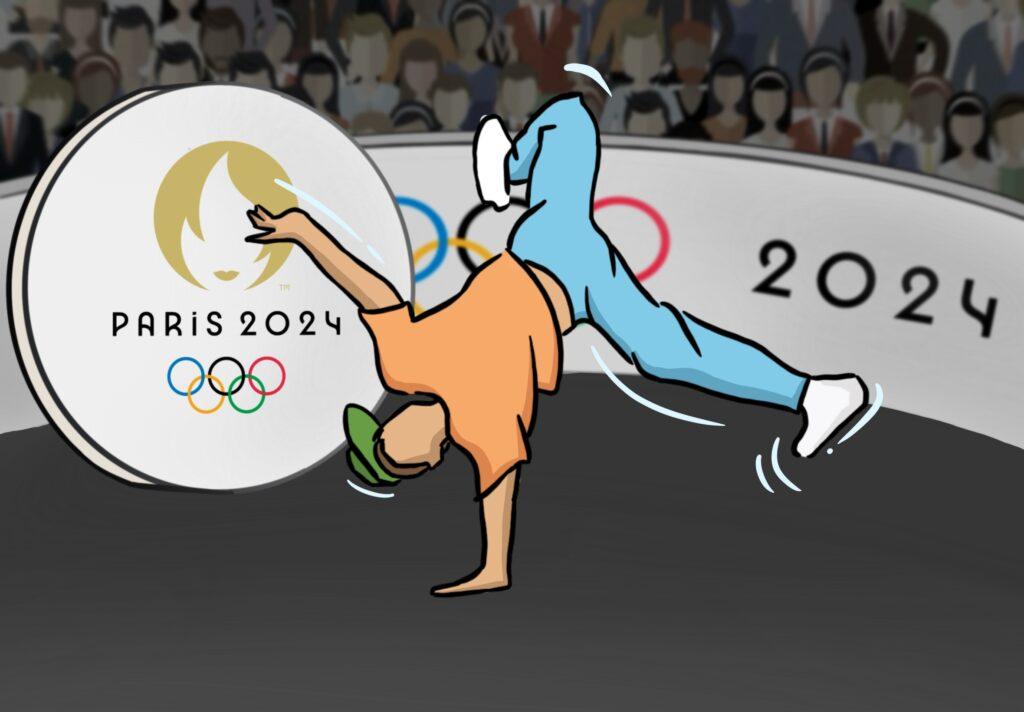The 2024 Summer Olympic and Paralympic Games in Paris are just over the horizon, with the Torch Relay ceremony scheduled to be held on July 26. This year, the Olympics will feature the return of several sports introduced in the 2021 Summer Olympics — and even introduce a brand new event, “Breaking.”
The 2024 Summer Olympics will feature 32 sports, totaling 329 events. Baseball and softball were both dropped from the 2024 program after not gaining enough traction to stay in the rotation and France not having a national baseball team.
Another speculated reason baseball and softball are being excluded from the 2024 Olympics, but set to return in 2028, is its gender inequity, with 8 more male athletes per team than female athletes. The International Olympic Committee (IOC) seeks to reach gender equity within athlete representation, with 45.6% female athletes in 2016, 48.8% in Tokyo and 50% (905 men and 905 women) in Paris.
Breaking added to 2024 Olympics
Breaking, commonly known as “Break Dancing,” is a style of dance that originated in the U.S. in the 1970s. International competitions were first held in the 1990s, popularizing the dance form both among hip hop communities and the general public along the way.
Breaking made its first Olympic showing at the 2018 Youth Olympic Games (for athletes age 15-18) held in Buenos Aires, Argentina. After receiving a monumental amount of support, Breaking will debut during the Paris 2024 Olympic Games on Aug. 9.
There will be 32 athletes participating, comprising 16 male and 16 female competitors. France, the host country, is guaranteed 2 seeds out of the 32 (one per gender). Four seeds are Universality Places, spots meant to give representation to countries who, through normal qualification channels, would have little to no representation. To receive a Universality position, an athlete has to place in the top 24 in the Olympics Qualifiers Series, which will be held from March to June. The remaining 26 spots are filled based on overall athlete rankings, where each National Olympic Committee (NOC) can send a maximum of four athletes to the Games.
Competitions, separated by gender, are formatted as 1v1 competitions. The scoring panel consists of five judges who score athletes based on six criteria: creativity, personality, technique, variety, performativity and musicality. In the round-robin tournament, breakers compete in 1v1 battles in which they take turns performing, their dance generally lasting somewhere between 30-45 seconds each. Breakers is not told what song the DJ will be playing beforehand, and must improvise their routine on the spot.
The countries with the strongest standings for the sport are the USA, Japan and France, but many other countries have promising athletes ready for competition. Some athletes to look out for include Ramu Kawai from Japan, Sergey Chernyshev from Russia and Emma Misak from Canada.
Skateboarding, sport climbing and surfing to return after seeing success in the 2020 Summer Olympics
In 2016, the International Olympic Committee announced that skateboarding would debut at the 2020 Summer Olympics in Tokyo as a method to engage a younger audience and draw in more interest from the youth. In recent years, skateboarding has seen a major increase in interest across the world, with more and more young individuals picking up the sport in hopes of making it to future games.
This year, up to 88 participants will participate in the event, with each NOC allowed a quota of six participants: three male and three female. Participants will compete in two events: Street and Park, where they are judged on how well they execute complex tricks and maneuvers within a time period of 45 seconds. During the Street event, competitors perform tricks on a course designed to resemble an urban environment, with handrails, stairs and similar common-day obstacles. Park takes place in a traditional skatepark-styled course with numerous bends, bowls and high-angle slopes. The events are scheduled to take place from July 27-28 and Aug. 6-7 for Street and Park respectively.
Surfing also debuted during the 2020 Summer Olympics and is returning this year after widespread support from viewers. The surfing event will take place from July 27-30, on the island Teahupo’o in French Polynesia, a mere 9,000 miles away from Paris.
Surfing will feature fewer competitors than skateboarding, with a total of 24 male and 24 female athletes and a maximum of 3 competitors from each NOC. Like the judging process for skateboarding, surfers will be judged on the speed, precision and difficulty of their tricks and maneuvers.
Another vanguard sport, sport climbing, got positive feedback during the 2018 Youth Olympic Games, and it was incorporated into the 2020 Summer Olympic Program and will continue in 2024. Sport climbing features two separate events: a combined event for lead and bouldering as well as an event for speed.
The sport climbing event has a total of 68 participants. The speed event hosts qualifiers on Aug. 5 and 6, while finals take place on Aug. 7 and 8. Boulder and lead semi-finals take place from Aug. 5-8, while finals take place on Aug. 9 and 10.
In bouldering, athletes are given up to 5 minutes per problem (the route taken up the wall) and the walls are 4.5 meters tall. In lead climbing, athletes get 6 minutes per problem and walls are 15 meters tall. In both, points are awarded based on the number of completions and the number of zones reached, while points are deducted for failed attempts.
Speed climbing is done on a 15-meter wall where the first person to reach the top wins. Speed climbing takes the format of dual brackets; athletes will progress through eliminations until one athlete is left.
Overall program changes for the 2024 Games
Despite the introduction of the new breaking event, the Paris 2024 Olympic Games has 10 fewer events than the previous games, making it the first Games since 1960 to have fewer events than the previous Olympics.
In our opinion, baseball should have stayed an Olympic sport. While the efforts of the IOC to achieve gender equality are commendable, the way that they are going about these changes are not the best. Baseball has significantly more popularity than many of these other sports. Additionally, there are other ways to make up for the gender cap. For example, more countries could be introduced to the cycle of softball or other sports with more female athletes could be added.
Additionally, breaking may not have been the best choice to replace baseball and softball. While breaking is a highly creative, technical and physically demanding sport, it has very little tradition. Many people have never even heard of it before. While the Olympics will help it garner more publicity, for most people, breaking will simply fall under the list of events that they will not watch. Given the opportunity to propose up to five additional sports, the Paris Organizing Committee selected highly youth-centered sports with a focus on creativity. The IOC hopes that these sports — surfing, sports climbing, skateboarding and breaking — presented in the Olympics will inspire millions of children to take up sports and set the standards for the Olympic Games for years to come.



























